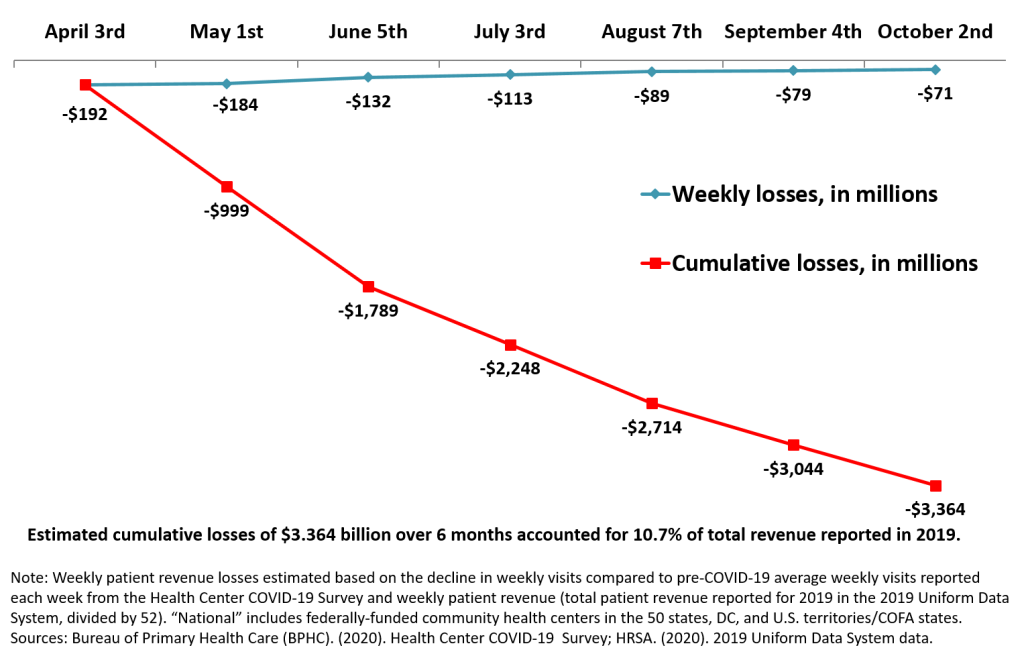As the COVID-19 pandemic surges on across the United States, a new analysis, “Months into the COVID-19 Pandemic, Community Health Centers Report Signs of Improvement, But Face Financial Uncertainty” reports on the COVID-19 experience of the nation’s community health centers over a six-month period.
Utilizing data from the Health Resources and Services Administration’s (HRSA’s) weekly Health Center COVID-19 Survey for the period April 2 to October 3, 2020, the authors document how health centers immediately rose to meet the immense local challenges of a global public health crisis, by initiating coronavirus testing, conducting more than four million diagnostic tests, and adapting care such as telehealth to address patient needs. Measures of operational capacity including temporary site closures, staff unable to work, and declines in weekly visits have improved over the six months, but remain substantial and vary considerably by state. However with visits down overall, continuing site closures, reduced staffing and limited financial relief, the pandemic has taken an enormous financial toll. Cumulative health center patient revenue losses over six months are estimated at $3.364 billion, or nearly 11 percent of total revenue reported nationally in 2019.
Without long-term stable federal investment and the extension of the Community Health Center Fund, now set to expire on December 11, entire communities could lose access to high quality, affordable health care. The most extreme consequences are likely in Latino, Black, and other minority and low-income communities, those known to be the most adversely affected by COVID-19 and other public health crises. In the face of deep financial losses, continued financial uncertainty, and with the threat of a “second wave” looming, the future of our nation’s health centers should be a cause for both deep concern and renewed support.
The report is authored by researchers at the Geiger Gibson/RCHN Community Health Foundation Research Collaborative at the George Washington University Milken Institute School of Public Health (Milken Institute SPH).
Read the report, Months into the COVID-19 Pandemic, Community Health Centers Report Signs of Improvement, But Face Financial Uncertainty.
__________________________________________________________________________________________________________________________
ICYMI
Infographic: COVID-19’s Impact on CHCs
A recent infographic from the Geiger Gibson/RCHN Community Health Foundation Research Collaborative at Milken Institute School of Public Health depicts the impact of COVID-19 on the nation’s community health centers through September 18, 2020. View the full infographic on our website.
At the time of publication, estimated patient revenue losses stood at $3.22 billion, That figure now stands at $3.364 billion from April 2 to October 3, 2020, as depicted in our new report and shown here:

__________________________________________________________________________________________________________________________
Upcoming Webinar
The National Health IT Collaborative for the Underserved (NHIT) is hosting a new webinar, part of their NHIT- Community Transformation Forum. RCHN CHF is proud to support this NHIT series as a Community Transformation Partner.
Topic: Why Advocacy Matters and How to Influence Policy!
Date: Thursday October 22, 2020 at 2pm EDT
Presented by Okey K. Enyia, MPH, Enyia Strategies.
To register for the upcoming webinar and view recordings of past sessions, please visit nhitc.org/community-transformation-forum.html
__________________________________________________________________________________________________________________________
Membership Monday Spotlight!
The mission of the Community Health Association of Mountain Plains States (CHAMPS) is to provide opportunities for education and training, networking, and workforce development so that health centers in Region VIII (comprising Colorado, Montana, North Dakota, South Dakota, Utah and Wyoming) can better serve their patients and communities. CHAMPS was founded in 1985 to bring together health centers and PCAs in Mountain/Plains states and is celebrating its 35th anniversary in 2020.
CHAMPS provides a broad range of programs and services to help member organizations serve their communities more effectively. The Association collects and disseminates data and communications about federal policy, funding, and training opportunities; offers innovative education and training for Region VIII health center staff at all levels; provides effective networking and collaboration opportunities; supports workforce development; and promotes best practices in staff recruitment, retention and clinical quality improvement. Among The myriad programs and services CHAMPS offers is The Mountain/ Plains Clinical Network (MPCN), which facilitates the professional, administrative, and educational development of all Region VIII health center providers. It’s Workforce Development Program, established in 2003, addressed the unique but interrelated issues of current and future CHC professionals on a variety of levels, from students considering their future in community health, to current clinicians, managers, administrators, and board members.
CHAMPS actively assesses the evolving needs of the region and works to ensure that Mountain/Plains states issues are brought to the forefront of regional and national decision-making. Looking ahead, CHAMPS will continue to strengthen the Region VIII health center network.

Community Health Association of Mountain Plains States (CHAMPS) staff members.
Follow our Membership Monday feature on Facebook and Twitter for more stories on the extraordinary work and history of our nation’s CHCs and PCAs.



